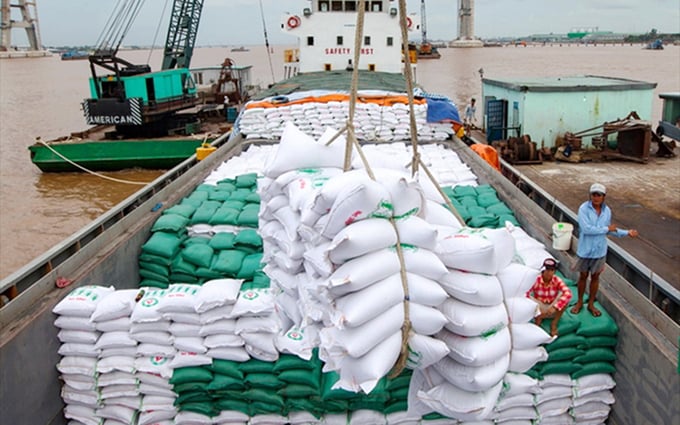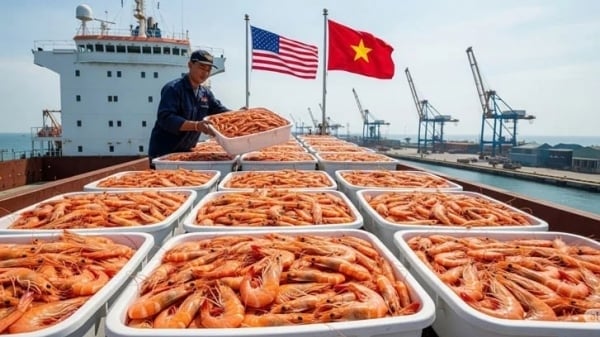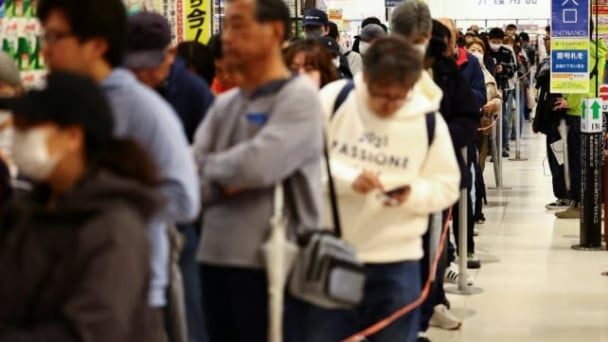June 17, 2025 | 10:08 GMT +7
June 17, 2025 | 10:08 GMT +7
Hotline: 0913.378.918
June 17, 2025 | 10:08 GMT +7
Hotline: 0913.378.918
According to the Vietnam Trade Office in the Philippines, since the beginning of 2023, due to various factors, the prices of many essential goods in the Philippines have been on the rise, with rice experiencing the most significant price increase.
In the first quarter of 2024 alone, the price of rice increased by about 24.4%, significantly contributing to the rise in inflation in the Philippines. The Philippine government had previously implemented price ceiling measures to control the rising cost of rice, but these measures were not successful.

Vietnam's rice exports to the Philippines will remain stable in the near future.
Given the situation, the Philippine government has recently urged the bicameral legislature to study amendments to Law No. 11203 on the liberalization of rice import and export trade, aiming to restore direct intervention powers to the National Food Authority (NFA) for regulating and stabilizing the market.
The Vietnam Trade Office in the Philippines believes that although the amendment bill has not been officially approved, it will not fundamentally affect Vietnam's rice exports to this market.
Firstly, information indicates that the amendments will only restore the NFA's authority under Law No. 11203 to directly participate in regulating and stabilizing the rice market. The NFA will be permitted to directly or through farmer support programs purchase rice from domestic farmers for processing and/or importing rice to regulate and stabilize the market.
In theory, restoring the NFA's authority to directly regulate and stabilize the rice market could lead to a reduction in rice prices in the Philippines in the near future. However, it will be challenging for the NFA to achieve the expected results.
The first reason is that since the implementation of Law No. 11203, the Philippine rice market has been operating under a market mechanism and has stabilized. The Philippine government cannot arbitrarily repeal Law No. 11203, which allows for the liberalization of rice import and export trade. Therefore, the participation of private enterprises in this market cannot be restricted in the short term.
Allowing the NFA to stabilize the rice market through direct buying and selling will exert budgetary pressure on the Philippine government. The NFA's operations before Law No. 11203 resulted in significant budget deficits, which the government later had to cover.
Furthermore, to achieve its goals, the NFA must establish a personnel and infrastructure system to participate in the rice supply chain nationwide, including milling facilities, storage warehouses, and Kadiwa stores. The NFA cannot establish and build these systems in a short time.
Historically, the NFA could only purchase a small portion of the country's total rice production directly from farmers each year. Therefore, even if the NFA's authority is restored, its purchasing capacity may not meet expectations.
The NFA's market stabilization efforts will initially be limited to times of price fluctuations or emergencies as directed by the Philippine Secretary of Agriculture, thus having little immediate impact on the general rice market. The NFA's stabilization efforts mainly target medium and low-quality rice markets, serving the majority of poor or low-income people, and will not significantly affect the premium rice market.
Moreover, other aspects related to the freedom of rice import and export trade under Law No. 11203 remain unchanged. This means that traders are not restricted, and all entities still have the right to freely import export, and trade rice.
Therefore, the Vietnam Trade Office in the Philippines believes that Vietnam's rice exports to the Philippines will basically remain stable in the near future. The potential impact of any amendments to Law No. 11203 will not be significant until the Philippine government completes the necessary steps to restructure the National Food Authority (NFA), build a comprehensive network, and establish effective operational mechanisms to allow the NFA to intervene more directly and effectively in the rice market. Until these changes are fully implemented, the market dynamics are expected to remain largely unchanged, ensuring stable trade conditions for Vietnamese rice exporters.
The Philippines is currently the largest market for Vietnamese rice. In the first 4 months of this year alone, rice exports to the Philippines reached 1.5 million tons, valued at $ 936 million. This impressive figure accounts for 47% of the total volume and 46% of the total value of Vietnam's rice exports to all global markets.
Translated by Hoang Duy

(VAN) The political and cultural insulation of Japan’s beloved grain is falling apart, and experts warn the country’s relationship with the staple will have to adapt.

(VAN) Noting risks, report examines impacts of avian influenza, changing trade patterns since 2022, fish fraud, and shipping industry’s net-zero goals.

(VAN) Mr. Tran Quang Bao, General Director of the Forestry and Forest Protection Department, met and worked with the International Wood Products Association to promote cooperation in the field of timber trade.

(VAN) China's outbound shipments of rare earths in May jumped 23% on the month to their highest in a year, though Beijing's export curbs on some of the critical minerals halted some overseas sales.

(VAN) To sustain capital flow, administrative reform alone is not enough; what farmers truly need is an ecosystem where both government and businesses grow together in support.

(VAN) Vietnam and the United States are proactively working together, each in their own way, to ensure that every container of agricultural goods carries not just products, but also long-term trust and value.

(VAN) Stores have started selling rice from the government’s stockpile to feed demand for the staple.